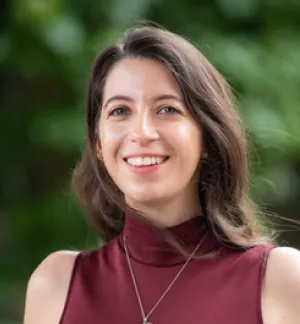National Security Fellows Network with Executives in National Security
Defense Project
The Belfer Center’s National Security Fellows (NSF), active duty military officers who have been selected to spend a year of study and research at Harvard Kennedy School, have recently begun a networking relationship with the national non-profit Business Executives in National Security (BENS). Headed by Belfer Center Senior Fellow and General (ret.) Joseph Votel, BENS includes more than 400 senior business and industry executives who volunteer their time and expertise to address the national security community’s most pressing challenges.
“This networking will enable the fellows to make connections that will be mutually beneficial in both the short run while they are at Harvard and over the long term after they leave,” said NSF Program Coordinator Natalia Angel. Members of BENS pair up with fellows who are most aligned with their own expertise or interest areas. Among other valuable mentoring, the members will help prepare the fellows to provide clear briefings to senior officers at the Pentagon on national security research they undertake during their fellowships.
The Future World Order Event Series
International Security Program
The existing global political-economic order has been ruptured by the rise of China, a broad backlash against globalization, uncertainties about the U.S. commitment to a rules-based system, and most recently, the Covid-19 pandemic.
What form might a future world order take, and what principles should guide efforts to construct it? The International Security Program’s Future World Order event series addresses these questions by examining individual topics ranging from traditional security issues such as arms control to newer, relevant issues such as digital trade. Professors Dani Rodrik and Stephen M. Walt moderate the sessions. The next seminar in the series, China, the United States, and the Future World Order, will be Monday, December 14.
Answering Today's Questions Through the Lens of History
Applied History Project
This autumn, the Applied History Project hosted a group of distinguished public servants and historians for its Applied History Series. Fredrik Logevall, Alexander Keyssar, Robert B. Zoellick, and Margaret MacMillan headlined this four-part series, each discussing with the Project’s Co-Director Graham T. Allison their celebrated new work.
Logevall kicked things off with a review of his biography JFK: Coming of Age in the American Century, 1917-1956, which depicts the developing historical sensibility of a future leader; Keyssar next presented his timely Why Do We Still Have the Electoral College?, which explores why this strange institution persists; Zoellick discussed his insightful America in the World: A History of U.S. Diplomacy and Foreign Policy, which mines history to guide the ambassadors of today; and MacMillan closed the series with War: How Conflict Shaped Us, which analyzes how war has molded history, politics, and society. Opened to the broader Harvard Kennedy School community, the series attracted hundreds of participants and sparked a broader engagement with the Applied History Project’s mission: to illuminate current challenges and choices by analyzing historical precedents and analogues. Learn more about the Applied History Project here.
Cyber Fellows Named to SC MEDIA’s 2020 Women in IT Security
Cyber Project
Priscilla Moriuchi and Tara Wheeler, Fellows with the Center’s Cyber Project and longtime IT security experts, have been named SC MEDIA’s Women in IT Security 2020 Honoreess.
Moriuchi has been named to SC MEDIA’s Cyber Veterans list for building knowledge at the intersection of tech and national security. Following 12 years in the National Security Agency, Moriuchi became Director of Strategic Threat Devlopment at Recorded Future where she tracked malicious cyber campaigns from other countries. Recently she moved to Apple, where she is continuing her focus on threat intelligence.
Wheeler has been highlighted in SC MEDIA’s Advocates category for bridging policy and tech. She has held high-ranking security roles at Symantec and Splunk and she wrote the book Women in Tech about the systemic problems facing women in technology fields. She recently earned a Fulbright fellowship, currently delayed due to COVID, with which she will study how cyberwarfare fits into our current understanding of war crimes. She will attempt to quantify the damage from the state-sponsored faux ransomware Wannacry that disrupted the British National Health Service.
Middle East Initiative Fellows Win Best Papers from APSA
Middle East Initiative
Tugba Bozcaga and Chagai Weiss, 2020-2021 Research Fellows with the Middle East Initiative, have been recognized by the American Political Science Association (APSA) for their excellent policy and graduate student papers, respectively.
Bozcaga, a Postdoctoral Research Fellow with a PhD in Political Science from the Massachusetts Institute of Technology, won the Best Comparative Policy Paper Award from the Public Policy Section of APSA and Honorable Mention for the APSA MENA Politics Section Best Paper Award. The paper was titled "The Social Bureaucrat." Chagai Weiss, a Pre-Doctoral Research Fellow and a PhD candidate in Political Science at the University of Wisconsin, Madison, was recognized as having presented the Best Graduate Student Paper at the 2019 APSA meeting by the Conflict Processes Section. His paper was titled “Curing Prejudice Through Representative Bureaucracies: Evidence from A Natural Experiment in Israeli Medical Clinics.”
Click here to return to Belfer Center Newsletter
"Belfer in Brief." Belfer Center Newsletter, Belfer Center for Science and International Affairs, Harvard Kennedy School. (Fall/Winter 2020-2021)


